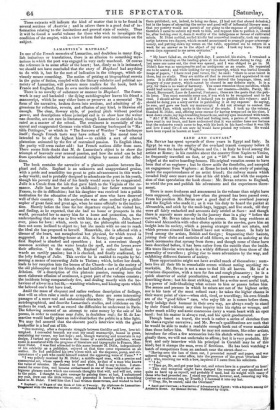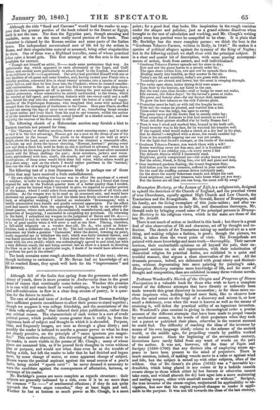SAND AND CANVASS. * MR. BRYAN has spent upwards of three
years in Egypt and Italy. In Egypt he was in the employ of the overland transit company before it passed from the hands of Waghorn and Co. : in Italy he lived among the artists at Rome; in his rambles about the country from Naples to Venice, he frequently travelled on foot, or got a "lift" on his road ; and he lodged at the native boarding-houses. His original vocation seems to have been that of an engineer ; but he threw aside the theodolite, and accepted an engagement from Waghorn : at Rome he took to the study of painting, under the superintendance of an artist friend; the railway mania which invaded Italy once more saw him at his old trade ; and with the suspen- sion of that speculation the book closes : Mr. Bevan returns to England, to wield the pen and publish his adventures and the experiences there- anent.
There is more freshness and amusement in the volume than might have been supposed, considering how often the ground has been passed over. From his position Mr. Bevan saw a good deal of the overland journey and the English who made it ; as it was his duty to board the packet at Alexandria, and stick by the mail-bags, luggage, and live stock, till they were all fairly embarked and accounts duly settled at Suez : and though there is scarcely more novelty in the journey than in a play " before the curtain," Mr. Bevan takes us behind the scenes. His long residence at Cairo and Alexandria with other choice spirits in the service, gave him an insight into its society, which a passing stranger could not attain, and which persons situated like himself have not written about. In Italy he lived among the artists, British and foreign ; frequenting their haunts, joining their clubs and societies of odd fellows, as well as assisting at the mock ceremonies that sprung from them ; and though some of these have been described before, it has been rather from the outside than the inside. His tours likewise were made in a widely different style from those of the generality of travellers ; giving rise to more adventures by the way, and exhibiting different features of society. These opportunities might not have availed much of themselves : num- bers live all their life in remarkable scenes without noting anything re- markable. Mr. Bevan is not a man to find life all barren. He is of a vivacious disposition, with a turn for fun and rough pleasantry; he is a quick observer of social peculiarities, and possesses a ready vigour in describing them; but his most striking, and for a writer most useful trait, is a power of individualizing what occurs to him or passes before him The scenes and persons in which be mixes are not of the highest order, nor is his taste of the most refined cast; he takes the higher classes in their worst point of view—when sick, tired, or travelling; his own friends are of the "good fellow" race, who enjoy life as it comes before them, freely indulge their humour in their own way, are always ready to stand by their friend without any close inquiry into his rights or wrongs, and under mach oddity and some coarseness carry a warm heart with an open hand : but his matter is always real, and his spirit goodnatured. Though based on travel, the work is rather a series of sketches from life than a regular narrative ; and Mr. Bevan's qualifications are such that he would be able to make a readable enough book out of worse materials than those before him. Whether he may not sometimes, like other artists, introduce for effect a few accessories into his sketch which were not ori- ginally there, we will not undertake to affirm; but it is very probable. His first and only interview with his principal in Cornhill may be of this kind; but it stamps the man, even if fictitious. He has been watching a batch of competitors from an ambush near the street-door-
"Having seen the last of them out, I presented myself and paper, and was ushered through an outer office, into the presence of the great Overland him- self; who, receiving me with a bow, inquired if I came from his solicitors.
"'I do.'
"'Then go, Sir, and get year hair cut, and return here in a quarter of an hour.' "This cool reception might have damped the courage of any applicant not quite so hard up as tnyselç and probably if used, had its weight with many of awe who had preceded me. I stood my ground, however, and, removing my wig, (rather an exuberant one, by Truefit,) I rammed it into my hat.
"' Pray, Sir, be seated,' said the Overland."
• Sand and Canvass; a Narrative of Adventures In Egypt; with a Sojourn among th• Artists in Rome. By Samuel Bevan. Published by Gilpin. Although the title "Sand and Canvass" would lead the reader to sup- pose that the greater portion of the book related to the Desert or Egypt, such is not the case. Nor does the Egyptian part, though amusing and readable, seem to us the most really novel portion of the book. That character is claimed by the Roman section and some parts of the Italian tours. The independent unrestrained sort of life led by the artists in Rome, and their singularities natural or assumed, bring other singularities to them. One of these was a Highland traveller, some of whose practical jokes raise a broad grin. This first attempt at the fine arts is the most available for extract. "Though not himself an artist, D— made some pretensions that way. An unfortunate dog, which appeared to exist alternately at the Lepri, and Cafe Greco, and seemed more particularly to attach itself to the English, was enticed in an evil hour to D--'s apartment. Our artist had provided himself with one or two bladders of oil-paint and some brushes, and, having coaxed poor Piaci° into a suitable position, converted him in about twenty minutes into a species of nonde- script hysena, and then let him loose into the Condotti ; where he created consider- able consternation. Such as first saw him fled in terror to the open shop-doors; while the more courageous set off in pursuit, chasing the poor animal through a funeral procession, whose solemnities he utterly confounded, to the Greco, which he entered at full speed, and upsetting Antonio with two mezzi-caldi and a caffe nero, forced his way into the omnibus-room amid the huees of a tribe of ragga- muffins of the Popnlusque Romanns, who imagined that some wild animal had escaped from the menagerie of Guillaume in the Corea. Here poor Piaci° shuffled in and out among the lege of some ten or more of us, transferring broad streaks of burnt umber and ivory black from his coat to our trousers, whilst the author of all the mischief had unconcernedly seated himself in a shaded corner, and was enjoying the success of his first essay in oils."
The following sketch of a Mahometan auction may furnish a hint to Eastern tourists not pressed for time.
"The Harraat,' or walking auction, forms a most amusing scene ; and in order to view it to the best advantage, Hassan got me a seat on the divan of one of his acquaintance in the bazaar. The goods to be disposed of are held at arm's length above the head, and as soon as the owner has obtained a reasonable offer, he rushes up and down the bazaar shouting, ' Ilarraat, harraat ! ' getting every now and then a fresh bid, until he finds no one is inclined to advance, when he is compelled to let his wares go to the last bidder. In this manner I saw silver-mounted pistols sold for fifteen shillings the pair; Arab scimitars, jackets and waist- coats, embroidered with lace, scarfs, ink-stands, and red caps, and some amber mouthpieces; of these some would fetch their full value, whilst others would go fora mere song: and on the whole I would rather purchase in the ' harraat,' than run the risk of a lengthy bargain at a shop."
The following test of a true Damascus blade is perhaps one of those stories that may have received a little embellishment.
"My own object in visiting the bazaar was to effect the purchase of a sword or scimitar, in order to complete my costume du pays: but as I found that those exposed for sale in the Turkish quarter were of a better quality than I needed, and of a price far beyond what I intended to give, we repaired to another portion of the bazaar, where I could select from among some thousands of all kinds and qualities. As the weapon was to be used as an ornament only, and would have answered my purpose equally well had the blade been firmly screwed to the scab- bard, or altogether wanting, I selected an undeniable Brummagem,' with a tastily ornamented horn handle and goodly external appearance. For the silken cord and tassels which form the appendages I had to walk to an entirely dif- ferent quarter, where such articles are exclusively manufactured; and, after a due proportion of bargaining, I succeeded in completing my purchase. On returning to the hotel, I submitted my weapon to the judgment of Raven and Dr. A—; who resolved to test its value by actual experiment. A sword-blade is considered to be of good quality when it will sever a nail at one blow. Placing, therefore, a full-sized tenpenny on a wooden door-sill, Dr. A., who acted as Scher- frichter, took a deliberate aim, and let fly. The nail vanished, and I was about to pronounce my blade a genuine Damascus,' when the doctor, lowering its point, coolly requested me to withdraw the nail; which was fairly notched therein, and was found unmarked by the blow. I then dared the doctor to a similar experi- ment with his own sword ; which was unhesitatingly agreed to and tried, but with a very different result, the nail being severed: but as there is a knack in directing the blow so as to fall at a particular angle, I doubt if he would have allowed me to perform his part in the ordeal."
The book contains some rough sketches illustrative of the text; clever, though inclining to caricature. If Mr. Bevan had no knowledge of art till he reached Rome, they speak well both for his " improvement " and memory.



























 Previous page
Previous page